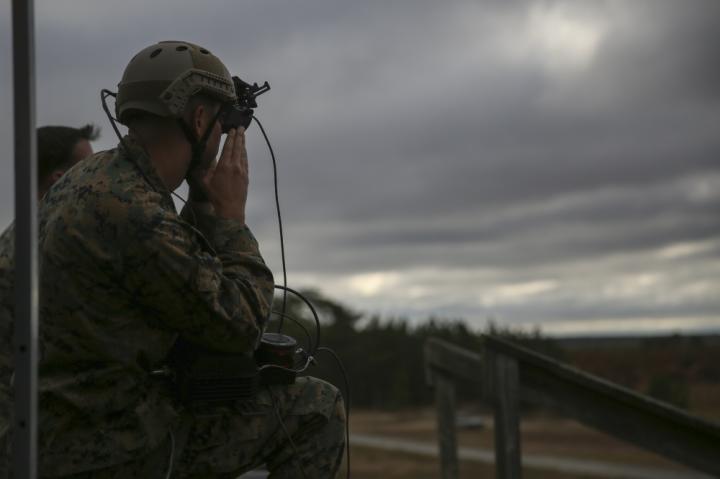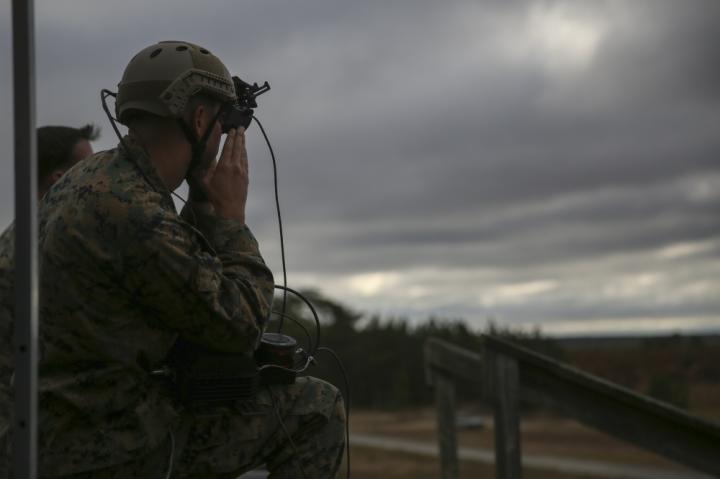
Credit: (U.S. Marine Corps photo by Sgt. Kaitlyn V. Klein)
ARLINGTON, Va.–Battlefield commanders face many scenarios requiring fast decisions–attacking an enemy position, evacuating injured warfighters, navigating unfamiliar terrain. Each situation pushes leaders to make quick yet informed choices.
To enhance these decision-making capabilities, especially for small-unit leaders, the 2nd Battalion, 6th Marines (2/6) –"The Spartans"– recently held a weeklong exercise called Spartan Emerging Technology and Innovation Week at Camp Lejeune, North Carolina. The event, also called Spartan Week, featured various training technologies–from quadcopters to augmented reality–developed with support from the Office of Naval Research (ONR) to accelerate the development of decision-making skills.
"We are working with 2/6 to develop a suite of new training tools that are easy to implement, tailorable to Marines' needs and include the ability to assess decision-making skills." said Dr. Peter Squire, a program officer in ONR's Expeditionary Maneuver Warfare and Combating Terrorism Department. "Exercises like Spartan Week enable the Marine Corps to better examine the use of training technologies to improve tactical decision-making at the small-unit level."
During Spartan Week, Marines used several ONR-sponsored technologies. These included the Interactive Tactical Decision Game (I-TDG) with an associated augmented-reality headset, the Augmented Immersive Team Trainer (AITT) and a quadcopter-based system for surveying and modeling terrain quickly.
I-TDG is a web technology-based application that allows Marines to plan missions and conduct "what if" tactical-decision games or simulation-based exercises. It supports maps and multimedia tools and links to ONR's HoloLens augmented-reality headset.
AITT comprises a laptop, software and battery pack, and helmet-mounted display–and can support forward-observer training in live field environments. It employs augmented reality technology, which inserts virtual objects into a real environment, to create realistic tactical scenarios–including friendly and opposing ground vehicles, aircraft and battlefield effects such as explosions from mortar shells and artillery.
To rapidly develop terrain models to support these technologies, Marines were trained to operate a prototype, quadcopter-based terrain-mapping system. Two Camp Lejeune training sites were flown over and mapped out, and the resulting imagery was used to build terrain models for the training systems.
"Small-unit leaders are tasked with making big mission decisions in an extremely short time window," said Natalie Steinhauser, a senior research psychologist at Naval Air Warfare Center Training Systems Division in Orlando, Florida, who took part in Spartan Week. "These decisions not only impact the success or failure of a mission, they affect life and death. With technologies like I-TDG, Marines can perform simulated missions in a safe classroom environment, carry out multiple missions and even use I-TDG as an after-action review tool."
Steinhauser said Camp Lejeune's Spartan Week was a success and that another event will be held at another location in early 2017. Perhaps the real measures of success, however, are endorsements from Marines who participated.
"For me, the best part of I-TDG was recreating simulated battles we conducted during past field exercises and using the system as a debrief on what we did wrong and how we could be better," said Lt. Andrew Veal. "Like athletes watching game film, you really experienced that 'a-ha' moment."
"The Spartan Week technology enabled all Marines, from squad leaders to riflemen, to evaluate their ability to make fast decisions," said Cpl. Fredrick Zuberer. "Marines tend to focus on using their bodies as weapons, but the most important weapon is the mind. Spartan Week helped sharpen that weapon beyond just pulling a trigger."
###
Media Contact
Bob Freeman
[email protected]
703-696-5031
@usnavyresearch
http://www.onr.navy.mil
############
Story Source: Materials provided by Scienmag





